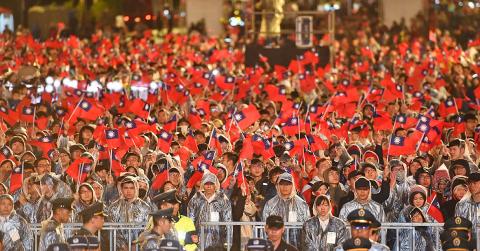President Tsai Ing-wen (蔡英文) yesterday proposed “four musts” as the basis for moving cross-strait relations in a positive direction, vowing to establish mechanisms to safeguard Taiwan’s national security.
China must recognize the existence of the Republic of China; respect the values of democracy and freedom Taiwan’s 23 million people hold dear; resolve cross-strait differences in a peaceful and equitable manner; and engage in negotiations with the government of Taiwan or an institution with a mandate from the government, Tsai said in her New Year’s Day speech.
These “four musts” are the vital basis for positive development of cross-strait relations, she said.

Photo: Liu Hsin-de, Taipei Times
The new formula appeared to be an attempt by Tsai to create a new starting point for relations with China, which have been at a standstill since her inauguration because of Beijing’s decision to cut off official communication with her administration.
It came one day before Chinese President Xi Jinping (習近平) is to deliver a speech on the 40th anniversary of a statement China first issued in 1979 that called for ending military confrontation with Taiwan and the opening of talks with Taiwan on expanding cross-strait exchanges.
Tsai yesterday rejected the view that the Nov. 24 elections, in which her Democratic Progressive Party (DPP) suffered stinging losses, were a rejection of her administration’s cross-strait policy.

Photo: CNA
The DPP administration was severely tested during the elections, but “I must emphasize that the election results absolutely do not mean that grassroots public opinion in Taiwan favors abandoning our sovereignty, nor do they mean that the people want to make concessions regarding Taiwanese identity,” Tsai said.
A drastic shift in the local political landscape after the elections has led the Chinese Nationalist Party (KMT) to push for cross-strait exchanges at the local government level based on the so-called “1992 consensus,” a format endorsing the “one China” principle that the Tsai administration has rejected.
Taipei Mayor Ko Wen-je (柯文哲) had reiterated at the Taipei-Shanghai forum last month his position that “the two sides of the Taiwan Strait are one family.”
Apparently referring to those positions, Tsai said that her administration was not opposed to normal cross-strait interactions or city-to-city exchanges, but that such exchanges would require the two sides to have a more realistic understanding of each other, including of the fundamental differences in their values, ways of life and political systems, so they can interact with each other in a healthy and normal manner.
China has been taking advantage of the openness and freedom of Taiwan’s democratic system to intervene in local politics and the development of society, but her administration would establish three mechanisms to ward off such threats, Tsai said.
The first would protect the livelihoods of Taiwanese, the second would enhance the nation’s national defense capability and the third would boost oversight and regulatory mechanisms for cross-strait interactions on issues that could compromise the nation’s sovereignty so as to consolidate its democracy, she said
Prior to her speech, Tsai attended a New Year’s flag-raising ceremony in front of the Presidential Office Building in Taipei.
Vice President Chen Chien-jen (陳建仁), Premier William Lai (賴清德), Legislative Speaker Su Jia-chyuan (蘇嘉全) and Taipei Mayor Ko Wen-je (柯文哲) were among the officials who participated in the ceremony — themed “Brave and Confident: One With the World” — in a steady drizzle and chilly winds.
Five newly naturalized citizens were invited to lead in the singing of the national anthem: US-born basketball player Quincy Davis, who plays on Taiwan’s national team; Turkish-born TV host Ugur Rifat Karlova; Lily Yang (楊萬利), a Burmese of Chinese descent; Tran Ngoc Thuy of Vietnam; and physician Peter Kenrick from Australia.
Performers at the ceremony included the Taipei Municipal Jianguo High School marching band, the team that represented Taiwan at the World Cheerleading Competition and the Feather Art of Drum and Dance troupe. The marching band won gold at the World Association of Marching Show Bands in Taipei in August last year and finished in the top three in the previous three years, while the troupe won gold at the Asian Percussion Festival in Tokyo in July last year.
The Taipei Municipal First Girls’ Senior High School marching band and a military honor guard also performed, as did the New Taipei City Junior Chorus, which won a silver medal at the World Choir Games in South Africa in October last year.
Some protests were also spotted during the ceremony.
Members of the Tax and Legal Reform League donned yellow vests and held up banners as they called for tax reform, while two pro-Taiwanese independence supporters carrying a flag that read “Deng Nan-jung [鄭南榕] — Taiwan’s national father” at a designated protesting zone in front of Jingfu Gate (景福門) called for Tsai to step down.
Deng was a democracy pioneer who self-immolated in 1989 in defense of “100 percent freedom of speech.”

‘ABUSE OF POWER’: Lee Chun-yi allegedly used a Control Yuan vehicle to transport his dog to a pet grooming salon and take his wife to restaurants, media reports said Control Yuan Secretary-General Lee Chun-yi (李俊俋) resigned on Sunday night, admitting that he had misused a government vehicle, as reported by the media. Control Yuan Vice President Lee Hung-chun (李鴻鈞) yesterday apologized to the public over the issue. The watchdog body would follow up on similar accusations made by the Chinese Nationalist Party (KMT) and would investigate the alleged misuse of government vehicles by three other Control Yuan members: Su Li-chiung (蘇麗瓊), Lin Yu-jung (林郁容) and Wang Jung-chang (王榮璋), Lee Hung-chun said. Lee Chun-yi in a statement apologized for using a Control Yuan vehicle to transport his dog to a

Taiwan yesterday denied Chinese allegations that its military was behind a cyberattack on a technology company in Guangzhou, after city authorities issued warrants for 20 suspects. The Guangzhou Municipal Public Security Bureau earlier yesterday issued warrants for 20 people it identified as members of the Information, Communications and Electronic Force Command (ICEFCOM). The bureau alleged they were behind a May 20 cyberattack targeting the backend system of a self-service facility at the company. “ICEFCOM, under Taiwan’s ruling Democratic Progressive Party, directed the illegal attack,” the warrant says. The bureau placed a bounty of 10,000 yuan (US$1,392) on each of the 20 people named in

The High Court yesterday found a New Taipei City woman guilty of charges related to helping Beijing secure surrender agreements from military service members. Lee Huei-hsin (李慧馨) was sentenced to six years and eight months in prison for breaching the National Security Act (國家安全法), making illegal compacts with government employees and bribery, the court said. The verdict is final. Lee, the manager of a temple in the city’s Lujhou District (蘆洲), was accused of arranging for eight service members to make surrender pledges to the Chinese People’s Liberation Army in exchange for money, the court said. The pledges, which required them to provide identification

INDO-PACIFIC REGION: Royal Navy ships exercise the right of freedom of navigation, including in the Taiwan Strait and South China Sea, the UK’s Tony Radakin told a summit Freedom of navigation in the Indo-Pacific region is as important as it is in the English Channel, British Chief of the Defence Staff Admiral Tony Radakin said at a summit in Singapore on Saturday. The remark came as the British Royal Navy’s flagship aircraft carrier, the HMS Prince of Wales, is on an eight-month deployment to the Indo-Pacific region as head of an international carrier strike group. “Upholding the UN Convention on the Law of the Sea, and with it, the principles of the freedom of navigation, in this part of the world matters to us just as it matters in the